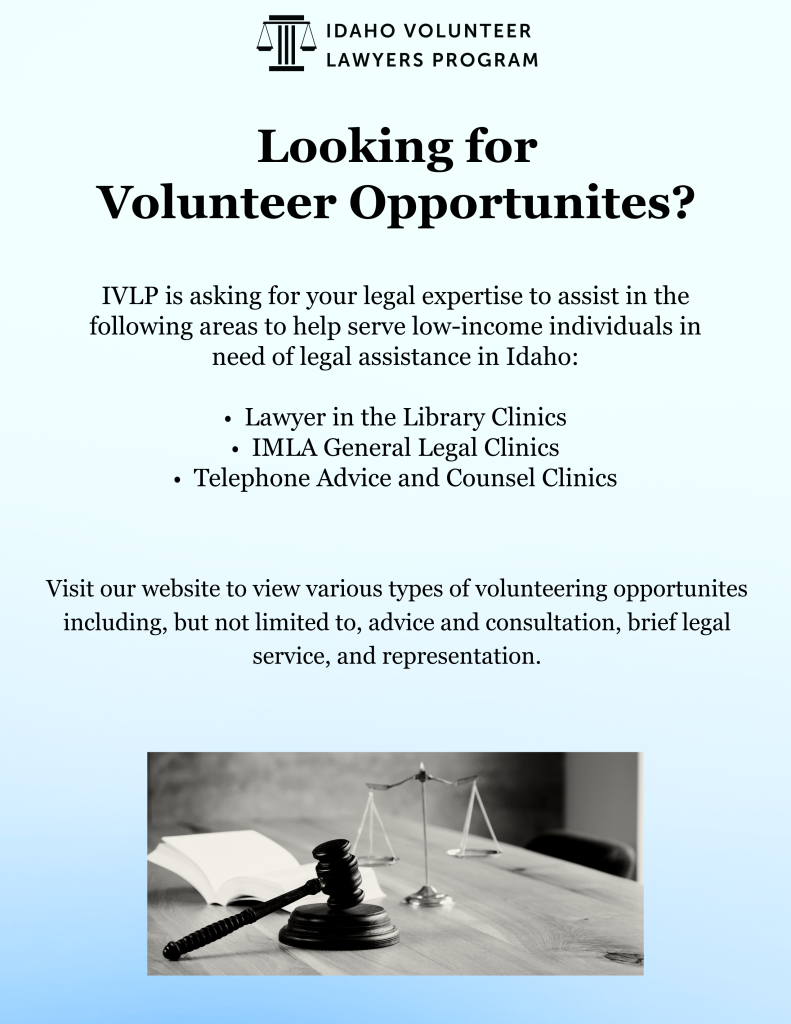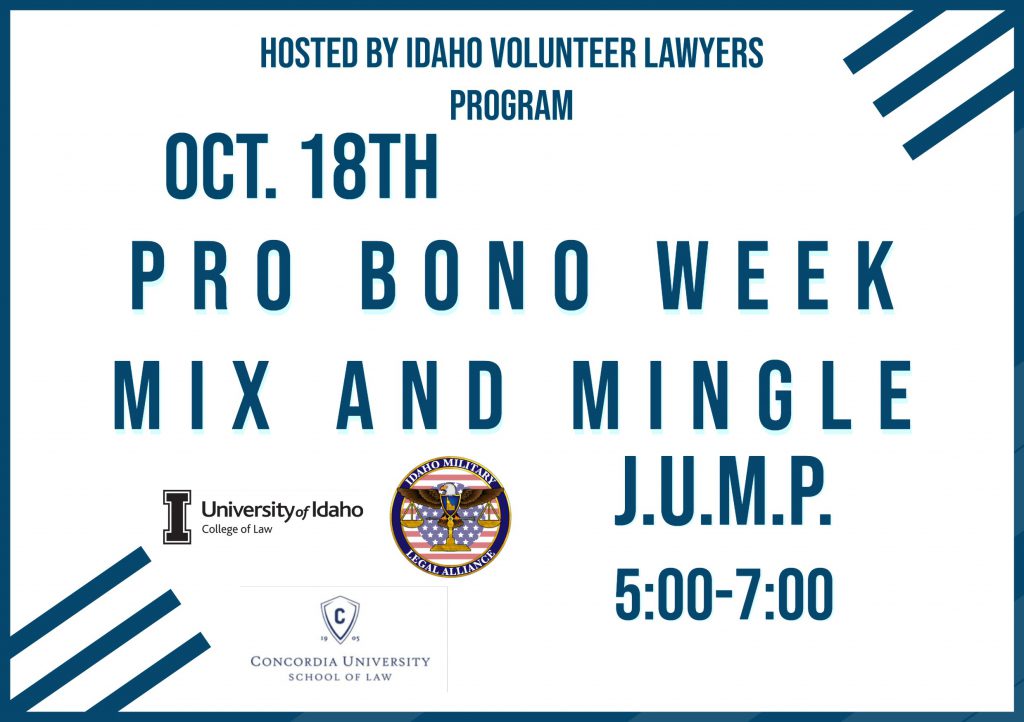Category: Uncategorized
2025 IOLTA Grant Applications Available
Volunteer for Various IVLP Clinic Opportunities

Voting Rights by Dylan Hughes
Voting, a vital part of citizenship in the United States, is how we elect who we believe has our best interests in mind. There are three amendments to the Constitution that establish the right to vote for all adults regardless of race, sex, and age. These amendments can, however, leave gaps that allow for unfairness when people are exercising their right to vote.
Passed in 1870, the right to vote regardless of “color, race, or previous condition of servitude” [1] can be found in Section 1 of the 15th Amendment. My Chinese ancestors wouldn’t have been able to vote until this amendment was passed. This right allowed for people of any race or skin color to vote, as well as the formorly enslaved. Also, even if you were a slave in the past, you could vote. While this amendment made all men eligible to vote, it left open the opportunity for unfairness. This included poll taxes and literacy tests [2]. I believe the individual responsibility that comes with this right is to make voting accessible to everyone, including people of color. 19.5% of Black people are below the poverty line, with Hispanics at 17%, and Asians at 8.1% [3], which could make it harder to commute a long distance to a polling place. After all, if you are allowed to vote but can’t, what good does this amendment really do?
It was another 50 years before the 19th Amendment was ratified, giving women the right to vote. At the time, in 1920, women were not seen as equals to men. Many women followed their husbands’ lead and let them make the decisions. As a female, my responsibility when I can vote will be to not let other people tell me who I should vote for. By voting for who I believe is the best choice, I am not placing myself below men like women did in the past.
51 years after this, in 1971, the 26th Amendment was ratified. Found in Section 1 of the 26th Amendment is the right to vote at 18 years of age. Before this time, men were drafted in wars, but they were seen as too irresponsible to vote. When I turn eighteen, my responsibility will be to stay educated on current politics so I know who I want to vote for. If I am not informed about the issues that affect me, how will I know which candidate wants to help with these issues?
In conclusion, it took over 100 years for these three amendments to be ratified, but to this day, unfairness persists. As a female of Chinese descent who will turn 18 in a few years, these amendments affect me in many ways. To realize the full potential of these rights, my generation needs to take on the individual responsibilities of increasing access to vote, having confidence in your vote, and making an educated vote.
References
[1] The US Constitution, Section 1 of the 15th Amendment, passed by Congress
February 26, 1869. Ratified February 3, 1870.
[2]https://www.senate.gov/artandhistory/history/common/generic/CivilWarAme
[3] https://www.statista.com/statistics/200476/us-poverty-rate-by-ethnic-group/
The United States Constitution Protects Numerous Individual Rights by Audra Bunn
The United States Constitution protects many individual rights that have impacted our country. Three rights that can be found in the Constitution include women’s right to vote, freedom of speech, and freedom of religion. These rights are all important and all come with great responsibility that people need to be willing to follow.
Women’s right to vote was very important because it gave women an opportunity to vote for their country. Women’s suffrage rights are found in the 19th Amendment of the Constitution of the United States. In 1920, this amendment was passed in the House of Representatives, the Senate and ratified in the states (nps.gov). However, this didn’t give voting rights to all women immediately. Women of color, lower income women, and women of crime were all excluded. Native American women couldn’t vote until 1924, when they were recognized as U.S citizens (nps.gov). The obligation of women voters is to know and understand the candidates. It is also important to not be affected by public opinion. This means that you can’t always assume what is being said is true. As voters, women need to think about what is going to benefit everyone, and not just them personally.
Freedom of speech allows us to speak our minds freely about something important. This right was adopted in the Constitution on December 15, 1791, as part of the First Amendment and the Bill of Rights (guardianlv.com). Freedom of speech means that whatever you write, or say, the government can’t jail or fine you, except in exceptional circumstances (guardianlv.com). With having the right of freedom of speech, you want to be responsible with what you say because it represents what you stand for. Make sure what you say does not hurt
others with hateful remarks, accusations, and untrue statements. When this is done, it does not show freedom of speech, but instead shows immaturity
or foolish behavior.
Freedom of religion, like freedom of speech, was first adopted into the Constitution on December 15, 1791, as a part of the First Amendment (“U.S Constitution”). This gives people the right to speak, act, and live their religious beliefs peacefully and publicly. It also protects their ability to be
themselves at work, class, or social activities (heritage.org). People can live in peace not having to be worried about being punished by the government (heritage.org). Another responsibility is not making fun of or bullying others because of their religion. So, when talking about your religion or someone else’s, try not to judge them for it because everyone is different.
In conclusion, The United States Constitution protects many individual rights that have made changes toward how we live today. Three rights that can be found in the Constitution include women’s right to vote, freedom of speech, and freedom of religion. With all these rights, there are great responsibilities as well. It is also very important to remember the way we act can represent us as human beings.
America’s Instruction Manual by Adison Buzzell
The Constitution of the United States is one of the most important documents ever written in American history. Our forefathers wrote this to act as an instruction manual for our government leaders and ensure a way to protect the rights of citizens. It also serves to limit government power.
Freedom of expression is one of our protected rights as American citizens. It is found in the First Amendment of the Bill of Rights. Expression includes our right to free speech, peaceful assembly, petitioning the government, and freedom of religion. This means that Americans can express their thoughts, opinions, and beliefs freely, without fear of persecution. Each citizen also has the individual responsibility to exercise these rights appropriately. America was founded on the belief that people should have the right to choose their own religion, not the government. As citizens, we must protect our rights by petitioning our leaders, or by peaceful protest, when we feel those rights have been violated, and to hold our officials accountable. The First Amendment is an important factor in keeping our voices and individuality.
The right to bear arms is another freedom protected by the Constitution. It is the Second Amendment found in the Bill of Rights. This right means a citizen can own firearms.
Our founding fathers knew that in order for people to remain free, they must have means to form a militia, should they need to, against enemies foreign and domestic. This includes a tyrannical government. Leaders are held more accountable when they fear the people. History has shown that the birth of tyranny in a country always begins with disarming the people. We learned this from Nazi, Germany and other communist regimes. We would never want this in America. This freedom to bear arms carries much individual responsibility. Citizens must be good stewards of this right and learn how to use firearms safely. People must also use good judgement, and be able to discern if and when a militia is truly necessary.
A citizen’s right to vote is an essential freedom. This right is represented in Amendments 15, 19, 24, and 26. The Constitution states that legal citizens can not be denied the right to vote based on gender, race, skin color, previous servitude, age (over 18), or tax status. Voting is how leaders of our country are selected at all levels of government. I believe it is the responsibility and civic duty of each citizen to carefully examine candidates for election and choose representatives who will uphold and protect
our Constitutional freedoms and liberties. Choosing not to vote, is forfeiting a citizen’s voice in government. The American people have the right to life, liberty, and the pursuit of happiness. All generations have the responsibility to understand their Constitutional rights and learn how to protect them. We must teach these truths if our country is to remain a free, sovereign, and independent nation. I know I will be one who always stands up for freedom and the Constitution.
Idaho School Places Sixth in National High School Mock Trial Championship

The mock trial team from The Ambrose School in Meridian placed sixth in National High School Mock Trial Championship. This is the second time the school has placed in the top 10 at the national tournament. Ambrose also placed sixth in the 2016 competition. The national championship was sponsored by the Indiana Bar Foundation from May 12 to 14. 46 teams from all parts of the United States as well as South Korea participated in the virtual tournament.
Ambrose qualified to represent Idaho at the National High School Mock Trial Championship by winning Idaho’s state competition in March. One of Ambrose’s coaches, Caitlyn Yates said that it was a privilege to coach a team of students this season who are so naturally talented and passionate about Mock Trial. “The students adapted quickly to the virtual format of this year’s competition and competed with competency and poise. They poured hours of work into preparing for both the state and national competitions, all while balancing demanding workloads from their classes. I am so proud of the students and all they accomplished!”
In addition to Caitlyn Yates, the team is coached by David Goodwin. Team members include Ben Perrigo, Corban Reyna, Hailei Browne, Lydia Colby, Audrey Hansell and graduating seniors Abby Davis and Kristen Stanciu. Stanciu, the team captain, said of the experience, “The chance to go to nationals this year with my team was the opportunity of a lifetime. I am so thankful that we were able to compete against some of the most skilled schools in the nation. I am also incredibly grateful to our coaches, parents, and volunteers who dedicated so much of their time to helping us succeed.”
All teams in the championship participated in four rounds of competition in virtual Zoom Courtrooms with the top two teams facing off for the national championship on Saturday afternoon. Idaho faced New Jersey, Florida, Texas, and New Mexico in their rounds of competition.
Ambrose Coach, David Goodwin, wanted to express his gratitude to the Idaho mock trial program. “The Idaho Law Foundation’s Law Related Education Program worked alongside Ambrose every step of the way after the state championship. The support from sitting judges like Hon. Jessica Lorello and others as well as mock trial experts like David Lloyd and Law Related Education Director Carey Shoufler was a labor on their part that paid dividends. The students and coaches learned so much from these professionals.”
Judge Lorello added, “Helping prepare Ambrose for the National Mock Trial Championship was a treat! The students were terrific to work with and very impressive. Congratulations to Ambrose on their outstanding performance!”
For more information about the National High School Mock Trial Championship, visit nationalmocktrial.org. For more information about Idaho’s mock trial program, visit idahomocktrial.org or contact Carey Shoufler.
About the National High School Mock Trial Championship
The National High School Mock Trial Championship is a hands-on civic education activity for high school students. The tournament is hosted annually by different states and includes up to 48 teams, including Guam, South Korea, the Commonwealth of Northern Mariana Islands, and State Champion teams from across the country. Working with attorney and teacher coaches, participants prepare a hypothetical legal case and present it in a simulated courtroom competition held in May. In real and virtual courtrooms, before real judges and attorneys, teams try cases they have been preparing since the beginning of April. From opening statements, through direct and cross examination of witnesses, to closing arguments, each team has its own attorneys and witnesses and must be ready to present either side of the case before juries who score their performances.
About the Idaho Law Foundation & Law Related Education
The Idaho Law Foundation is the charitable arm of the Idaho State Bar. As a program of the Foundation, Law Related Education is a statewide civic education program that works to enhance public understanding of the legal system and bring together attorneys and teachers to help students of all ages understand the role of law in a democratic society. For more information, visit idaholawfoundation.org.

2021 Law Day Podcast Contest Awards
The Idaho Law Foundation’s Law Related Education Program is proud to announce that three Idaho students were selected for prizes in the Foundation’s award-winning Annual Law Day Podcast Contest. Student podcasts explored the 2021 Law Day theme celebrating the importance of advancing the rule of law. Podcasts explored how to promote the rule of law to better defend liberty and create a more just society.
The top three student entries include:
- First Place: Sophia Willmorth, One Stone, Boise. Sophia is in tenth grade. Her podcast focused on the relationship between law and morality.
- Second Place: Sarah Cole, Mountain View High School, Meridian. Sarah is a senior. Her podcast explored the application of American civil liberties throughout US history.
- Third Place: Isabel Martin, One Stone, Boise. Isabel is a ninth grader. She created her podcast about inequalities in the American foster care system.
For the 2021 Podcast Contest, the Law Foundation began awarding an honorarium to the school of the winning student. Allison Parker and Jun Campion of One Stone offered their congratulations to Sophia and Izzy for their incredibly hard work on their winning entries. They indicated that the Podcast Contest has been a rich learning opportunity for One Stone students.
The Law Day Podcast Contest is open to Idaho high school students. Entrants submit 5 to 10-minute audio podcasts and can create their podcast individually or in groups. For 2021, the contest was sponsored by the Fourth District Bar Association, whose financial contribution allowed the Foundation to award prizes the top three entries along with an honorarium to the school of the first-place student.
Podcasts were critiqued by a panel of judges that included educators and attorneys. The judges scored the submissions on content, delivery, and production. One of the judges, Hon. Jessica Lorello, said, “I loved judging the podcast contest. The students are so creative in their presentations and thoughtful about the rule of law topic assigned in the prompt. It’s so inspiring to see (and hear!) students involved in civics education!”
The Idaho Law Foundation would like to thank our judges and sponsors for their support of the Podcast Contest. We appreciate their dedication to advancing civic education in our state.
The podcast entries can be accessed from the Law Foundation’s website. For more information about the Law Day Podcast Contest, contact Carey Shoufler, Idaho Law Foundation Law Related Education Director.
Idaho State Bar and Idaho Law Foundation Offering Limited Services
The Idaho State Bar and Idaho Law Foundation are committed to providing as many services as possible to lawyers and the public. To comply with guidance from State and Federal entities and to ensure the health and safety of the staff and our members, our offices, including the meeting rooms, are closed to the public and bar members.
Phones are staffed a few hours a day. If you call and are directed to voicemail, please leave a message – calls are returned as soon as possible. Staff members are available by email. Please reference the ISB/ILF Staff Directory.
Pro Bono Week Mix and Mingle- Oct. 18

 Official Government Website
Official Government Website
